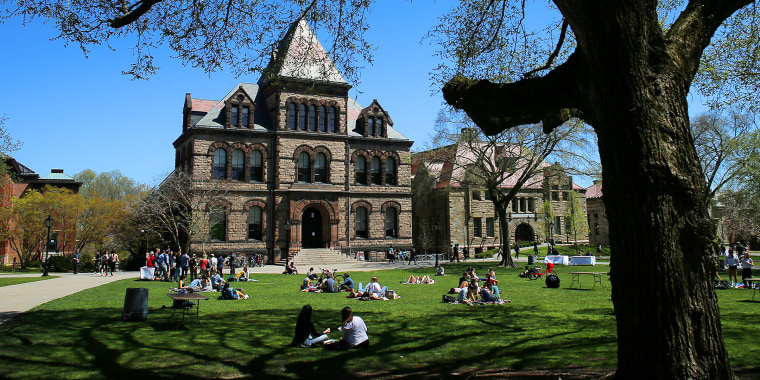Sixteen Ivy League and elite U.S. universities were sued in federal court for allegedly illegally conspiring to eliminate competitive financial aid offers to students in a price fixing scheme.
The suit alleges the conspiracy artificially inflated the cost of attendance for all students receiving financial aid and resulted in the overcharging of “over 170,000 financial-aid recipients by at least hundreds of millions of dollars.”
The demand for a class action jury trial, filed on Sunday in an Illinois federal court by five former Vanderbilt, Northwestern and Duke University students, seeks to compensate people who received financial aid packages that did not fully cover the cost of tuition, room and board from one of the 16 self-described “need-blind” universities since 2003.
The crux of the suit hinges on part of a 1994 federal education law called “Section 568,” an exemption from antitrust laws for colleges and universities that ostensibly don’t consider an applicant’s financial status while deciding admission, known as need-blind admission. This exemption allows need-blind colleges and universities to ignore century-old antitrust laws and collaborate with their competitors.

The lawsuit names Brown University, California Institute of Technology, University of Chicago, Columbia University, Cornell University, Dartmouth College, Duke University, Emory University, Georgetown University, Massachusetts Institute of Technology, Northwestern University, University of Notre Dame, University of Pennsylvania, Rice University, Vanderbilt University and Yale University as defendants.
Spokespeople for Dartmouth College, and the Universities of Pennsylvania, Chicago, Cornell, Notre Dame, Emory, Northwestern, Duke and Rice declined to comment on pending litigation.
Columbia, Georgetown, MIT and Vanderbilt did not immediately respond to NBC News requests for comment.
In an email, Yale University spokesperson Karen N. Peart wrote, “Yale’s financial aid policy is 100% compliant with all applicable laws.”
CalTech spokesperson Kathy A. Svitil declined to comment on pending litigation but said, “[w]e have confidence, however, in our financial aid practices.”
Brown University spokesperson Brian E. Clark wrote, “If we are served with the complaint, we will conduct a full review and respond as appropriate through the legal process.”
“Based on a preliminary review, the complaint against Brown has no merit and Brown is prepared to mount a strong effort to make this clear,” Clark wrote.
The lawsuit alleges that a framework called the “consensus methodology,” used in admissions by a consortium of universities called “568 Presidents Group,” is “explicitly aimed to reduce or eliminate price competition among its members” and says such an elimination of competition is “simply a means of coalescing around a uniform and lower level of aid to all prospective students.”
The 568 Presidents Group did not immediately respond to a request for comment. John J. DeGioia, Georgetown’s President and president of the 568 Presidents Group’s steering committee, also did not immediately respond to a request for comment.
“The Consensus Approach,” or consensus methodology, the group says on its website, “consists of a set of common standards for determining the family’s ability to pay for college” whose goal is “to reduce much of the variance in need analysis results that has been experienced in recent years.”
They specify further that the methodology “deals exclusively with the family’s ability to pay for college.”
The suit alleges “the purpose of the 568 Cartel is to reduce or eliminate competition between Cartel members over offers of financial aid to prospective students.”
Further, the suit says that “antitrust principles” dictate that “Competitors would not reach such agreement, because they would be incentivized to increase aid and reduce net prices of attendance to attract students.”
“Absent collusion, Defendants would compete on price for the students that they have decided to admit because these are the students that the admissions department has decided would satisfy the goals of the admissions process,” the lawsuit says.
The lawsuit also alleges that many of these colleges and universities are not fully need-blind, and thus, do not qualify for the antitrust exemption.
The suit alleges the 16 institutions consider the financial means of many of the students and families who apply in three main ways: by prioritizing the admission of the children of wealthy past “or potential future” donors, through a practice known as “enrollment management,” and by routinely and widely considering the financial means of the students admitted off of waitlists.
The suit says the 568 exemption from antitrust laws, which otherwise prohibit conspiracies among competitors, only applies at colleges and universities where “all students admitted are admitted on a need-blind basis,” which is to say, “without regard to the financial circumstances of the student involved or the student’s family.”
“The result of the 568 Cartel is thus not only to reduce the amount of total aid offered by each school, but also to reduce the total amount of aid offered to each prospective student at each Defendant school,” the suit alleges.
